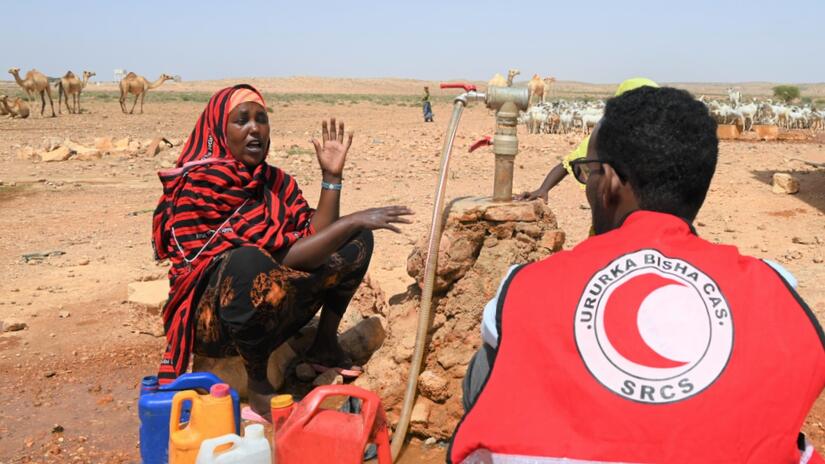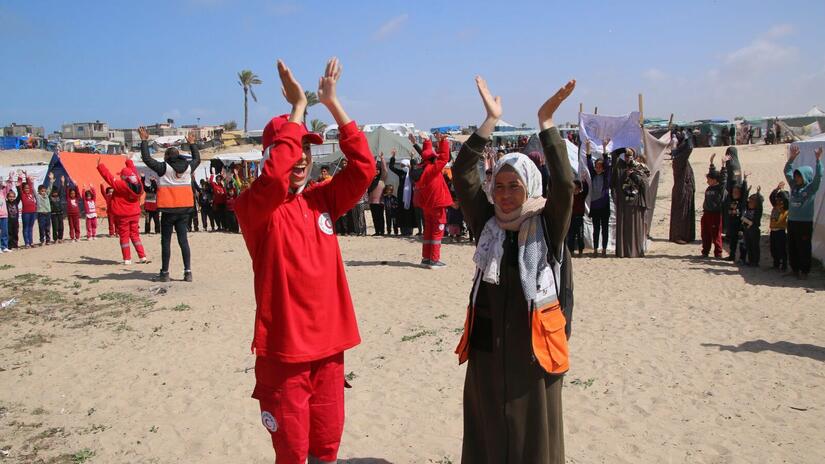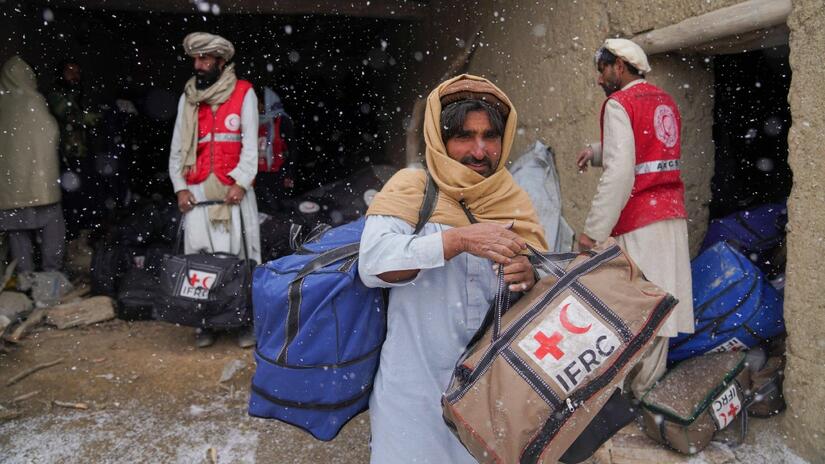Islamic humanitarian giving
As the world’s largest network of locally based humanitarian organizations and volunteers, the IFRC is uniquely positioned to ensure your Zakat or Sadaqah donation reaches the people and communities who need it most. Fully accredited for receiving Zakat donations, we are based in communities alongside those we support. We act before, during and after disasters and health emergencies to meet the needs of, and improve the lives of, vulnerable people—reaching millions every year.
Why trust the IFRC with your Zakat?
Because of its global reach and local presence through National Societies in 191 countries, the IFRC is trusted for its efficient delivery of relief in communities around the world.
Via the IFRC, your Zakat donation will help sustain healthy and safe communities and improve people’s resilience at the community level. Through its 191 National Societies, we provide food, water, shelter, health services, as well as disaster and disease prevention measures to the people who need it most.
You can donate your Zakat directly to specific IFRC emergency response operations in the next section (see below). You can also make a general Sadaqah donation to support our work around the world as well.
In addition, all Zakat funds collected and disbursed by the IFRC are subject to strict governance standards ensuring transparency in how the funds are collected and distributed.
Choose directly which project to support
Afghanistan complex emergency
Decades of conflict, food insecurity, earthquakes, climate-related disasters such as prolonged drought and sudden floods have combined to create one of the world’s most complex and severe humanitarian crises. Your Sadaqah donation helps the IFRC further scale up the Afghan Red Crescent Society’s ability to deliver assistance and support to more than 2,000,000 people in all 34 provinces who have dire need of health care, shelter or basic services such as water and hygiene.
Mediterranean rescue
A sharp increase in the number of migrants attempting the deadly Central Mediterranean crossing has led to death of thousands of people in recent years. Your Sadaqah donation enables the IFRC to provide humanitarian services directly to those in peril in the dangerous waters of the Mediterranean Sea. Working in partnership with SOS Mediterranée, the IFRC’s objective is to reduce human suffering and prevent loss of life through a fully able-to-assist rescue ship.
Sudan: Complex Emergency
After fighting broke out in Sudan's capital, Khartoum, in April 2023, the impacts of violence spread rapidly across the country. More than 1,000 people died and hundreds of thousands of people were internally displaced or fled across borders to escape the violence. Your Sadaqah donation helps us provide life-saving humanitarian assistance to people in at-risk locations and on the move.
Middle East: Complex Emergency
The dramatic escalation of hostilities in Israel and Occupied Palestinian Territories since October 2023 has killed tens of thousands, destroyed thousands of homes, forced thousands to flee and pushed critical health services to the brink of collapse. Your Sadaqah donation supports the Palestine Red Crescent and several other Red Crescent National Societies in the region to deliver critical relief to people impacted by the violence.
Hunger crisis in Africa
Sub-Saharan Africa is experiencing one of the most alarming food crises in decades—immense in both its severity and geographic scope. Roughly 146 million people across 38 countries in sub-Saharan Africa are suffering from acute food insecurity and require urgent humanitarian assistance. With the help of your Sadaqah donation, Red Cross and Red Crescent Societies across Africa are protecting the lives, livelihoods and prospects of millions of people.
A trusted partner

A Somali Red Crescent Society volunteer listens to a woman in Nugaal, Somalia talk about how drought has affected her life and livelihood. Demand has increased for the remaining water points that haven't dried up, forcing her to spend more time collecting water while also caring for her family at home.
Photo: IFRC/Rita Nyaga
By donating your Zakat or Sadaqah to the IFRC, you can have full confidence that your precious donation reaches those in need. As a trusted international humanitarian organization with a 100-year-plus track record, IFRC operates under high standards of transparency, monitoring and reporting to donors.
The IFRC is a trusted partner of all National Societies — including Red Crescent National Societies — because of the nature of its projects and interventions, which span many geographical areas that fall under the Organization of Islamic Cooperation. The IFRC has also received a fatwa certifying its eligibility to collect Zakat donations from the Islamic Shari’ah Research Academy - ISRA Research Management Centre, in Kuala Lumpur, Malaysia.
The IFRC always works to reach the most disadvantaged, hardest-to-reach people and communities with interventions specifically targeted toward addressing their needs and enabling their own path toward recovery.
Certified and accountable

A Palestine Red Crescent psychosocial support team member (right) next to an Egyptian Red Crescent volunteer during a recreational activity for displaced children in Rafah, Gaza
Photo: Palestine Red Crescent Society
With the help of Islamic Giving experts, the IFRC has adopted a dedicated policy and guidelines for Zakat donations to ensure the donations are used in a way that respects the principles and standards of Zakat.
The IFRC Zakat Policy was developed by specialised Shariah advisors and its Guidelines were reviewed and approved by worldwide recognized Fatwa bodies. Most importantly, the Islamic Shari’ah Research Academy - ISRA Research Management Centre, based in Kuala Lumpur, Malaysia has issued a fatwa stating that IFRC is certified to collect Zakat contributions.
In addition, any Zakat donation received for a specific project will be monitored, audited, and assessed from an impact point of view. All Zakat contributions will appear in our audited financial statements and all projects which benefited from Zakat will benefit from a periodic audit. Finally, IFRC will report periodically on the impact made by Zakat on the life of beneficiaries.
Frequently asked questions
Targeting four key areas

A man in Afghanistan collects vital supplies from the Afghan Red Crescent and IFRC to help him and his family through the harsh winter.
Photo: IFRC/Meer Abdullah
Taking into consideration the nature of its interventions, Zakat collected by IFRC will be targeting four categories:
• The Poor (Al Fuqara): The poor living without means of livelihood.
• The Needy (Al Masakin): People who cannot meet their basic needs.
• The Debtors (Al Gharimin): Those burdened by debts due to personal needs or social necessity.
• The Wayfarer (Ibnu Al-Sabil): Travellers who cannot reach their destination without financial assistance.
The four categories will be targeted by specific interventions dedicated for relief in cases of emergencies, crises, and disasters.
Preventing and alleviating human suffering
The IFRC’s objective is to "inspire, encourage, facilitate and promote at all times all forms of humanitarian activities by the National Societies, with a view to preventing and alleviating human suffering and thereby contributing to the maintenance and the promotion of peace in the world”.
The IFRC acts in accordance with the Fundamental Principles of the International Red Cross and Red Crescent Movement, which include in particular the principles of humanity, impartiality and neutrality.
